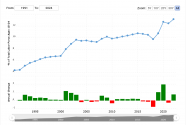On a two-year smoothed basis, growth for 2022 and 2023 was 4.2%, which is nothing close to what China achieved in the 40 years before
Only in relative percentage terms. In absolute terms, this is still one of the highest growth values in the history of China (and of the world).
And that's with their intentional crushing of the real estate sector + Western and global economic slowdowns, leading to lowered exports.
China also released statistics on youth unemployment (age 16-24) excluding students, which is 14.9%. The rate for the U.S. of the same age group is 9.4%. This is still unacceptably high.
It doesn't matter that 14.9% are not working when those who work contribute more than enough to make China grow at a historic pace as a hyperpower in the making.
Unlike in the US, where only 11% of their economy (GDP) is in manufacturing. What value do they get from all those retail stores, flipping burgers, lawyers, government administration, and liberal arts jobs?
China can't print money out of thin air and then boost the economy artificially and give people to spend for basically "free", while all work structurally easier jobs.
It's easy for the US to have better youth employment when their younger can basically all work in those easy 80% service-based jobs.
Meanwhile, in China, there is a much higher focus on very demanding, high-productivity manufacturing in high-tech more and more.
As I already stated, you see that most of the fixed asset investment this year got into high-tech industries that not everyone could work in (not everyone is innately that intelligent), as opposed to low-tech production and service sector fixed asset investment.
Everything is a tradeoff, yes, they have higher youth unemployment but are much more technologically and industrially advanced and sturdier economically than America.
Last edited:



